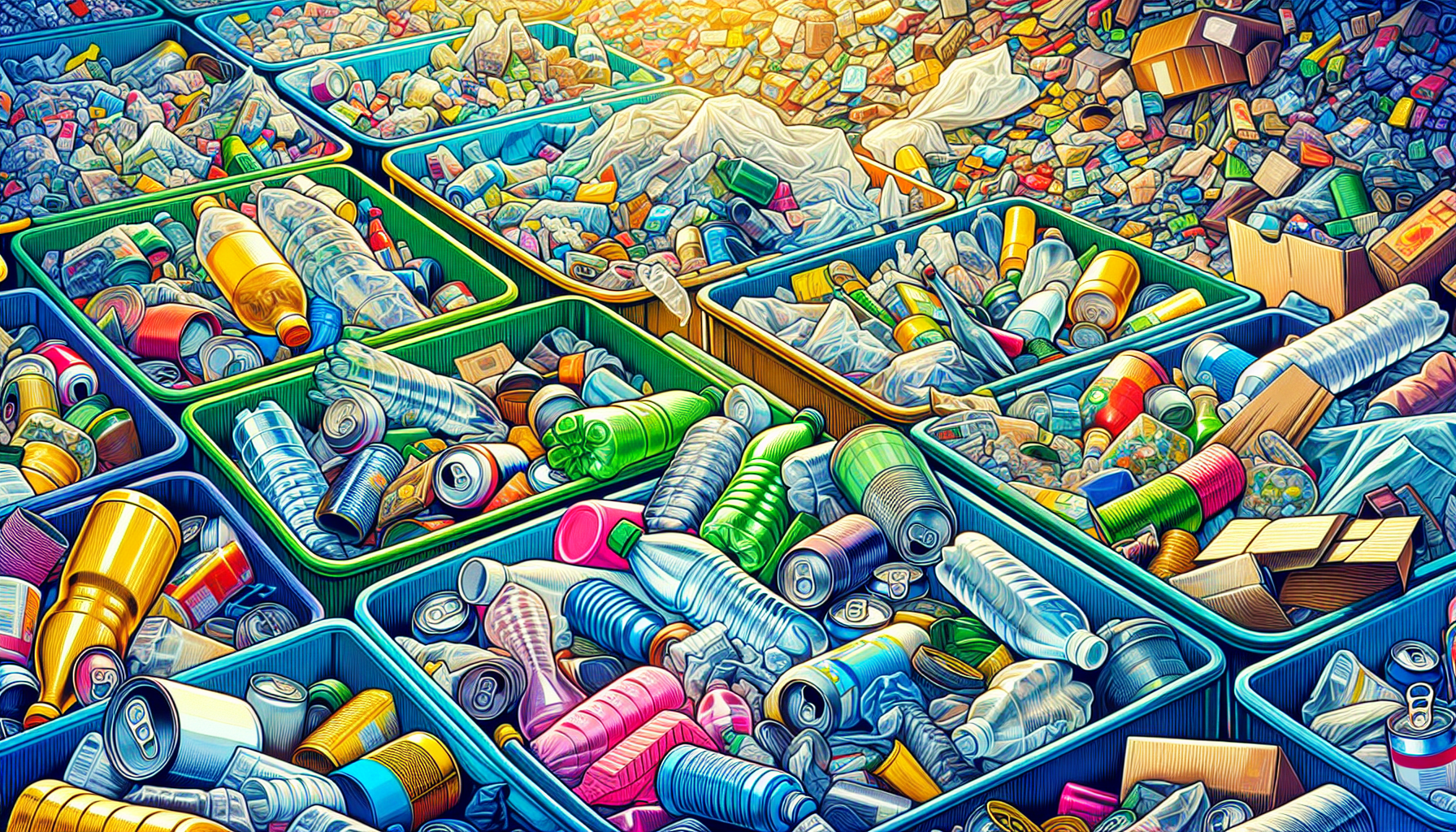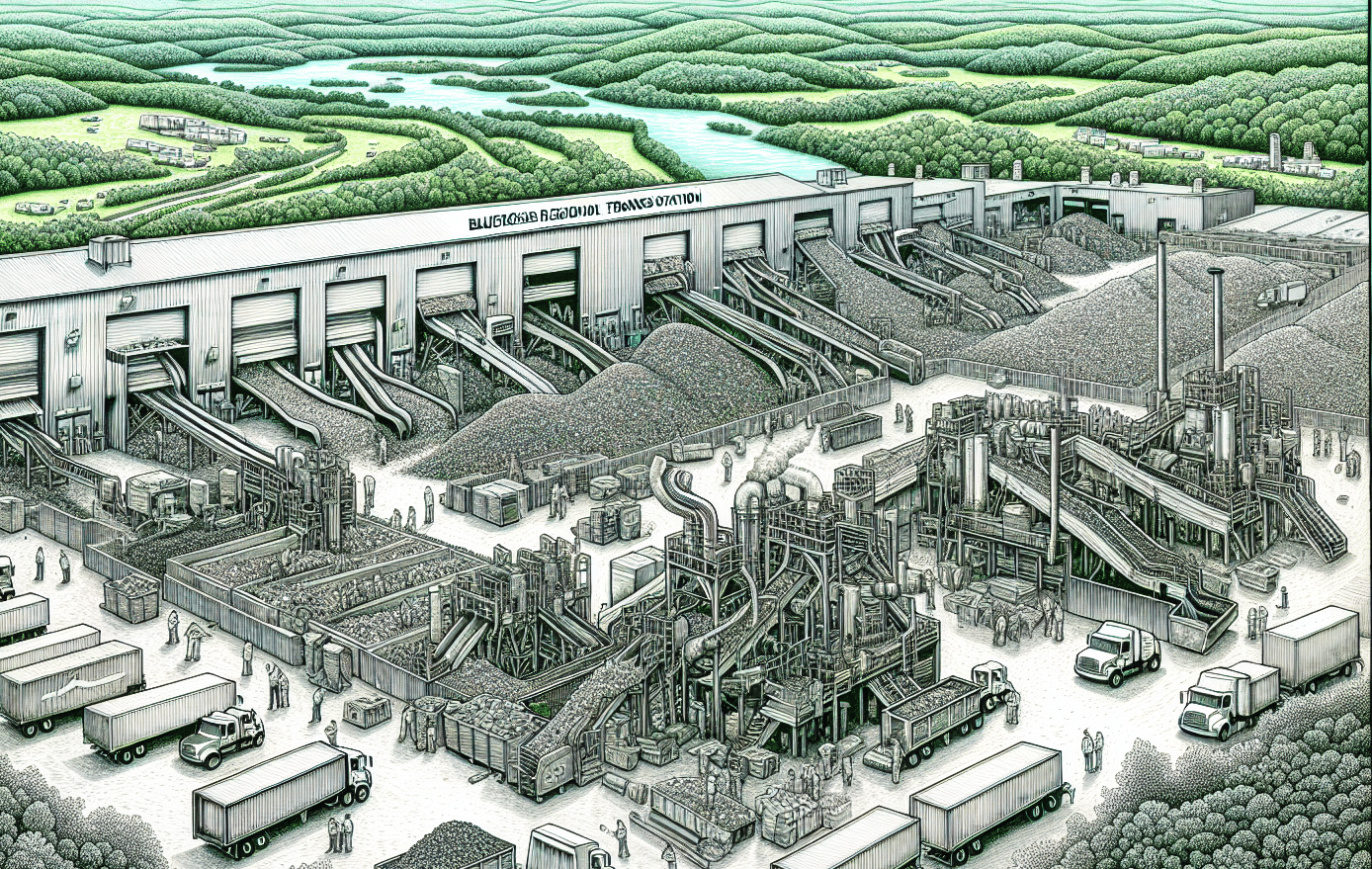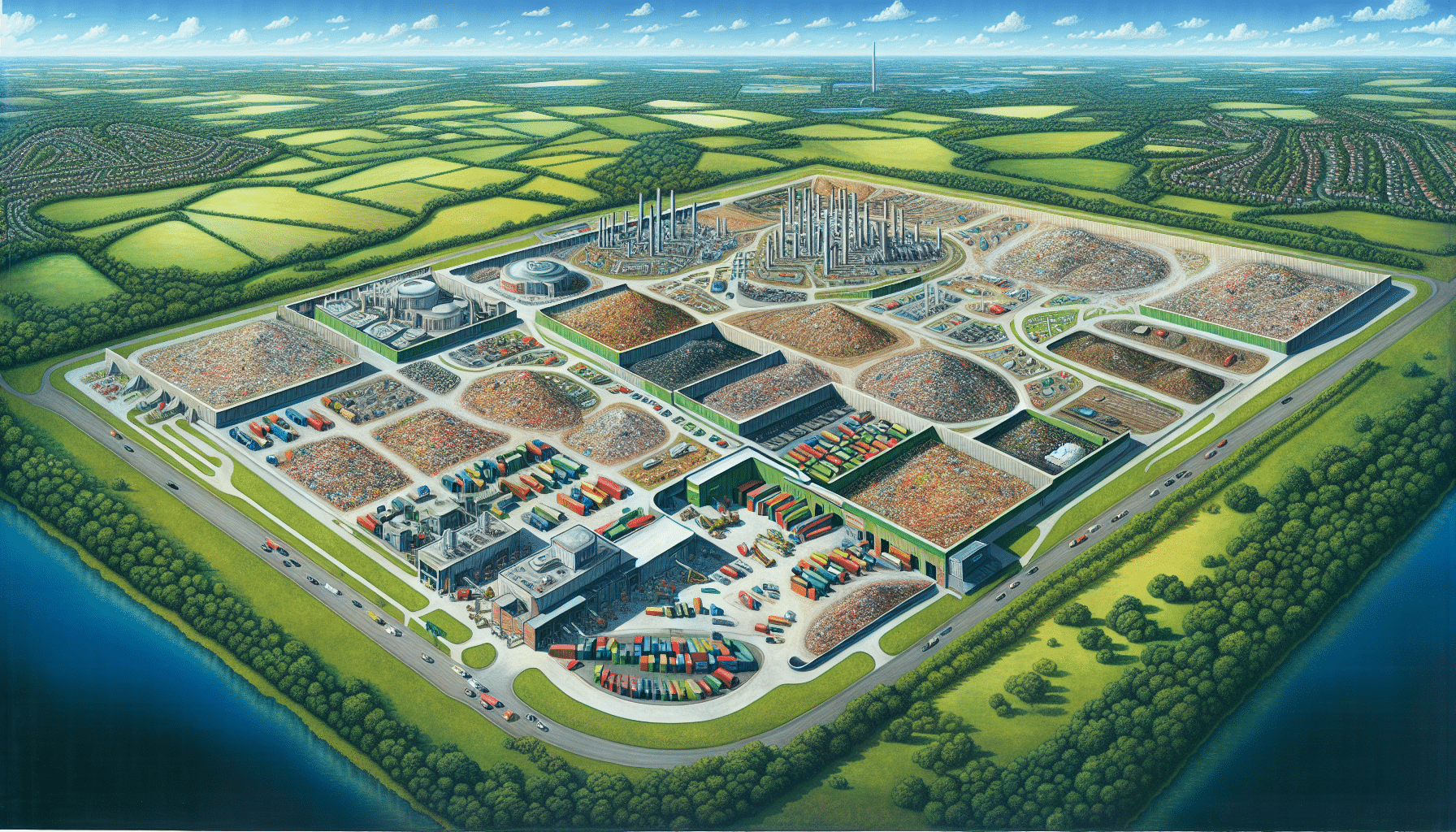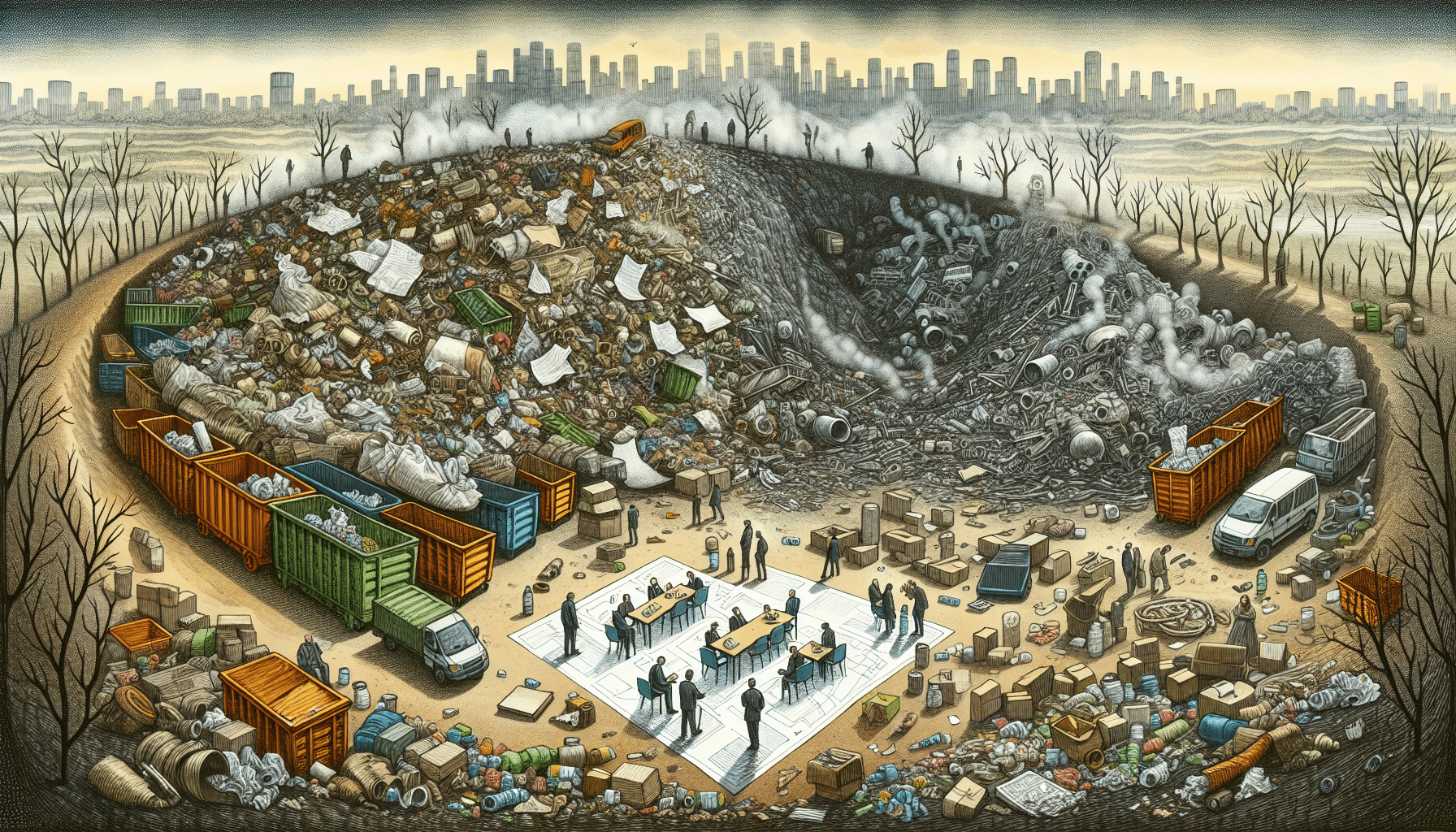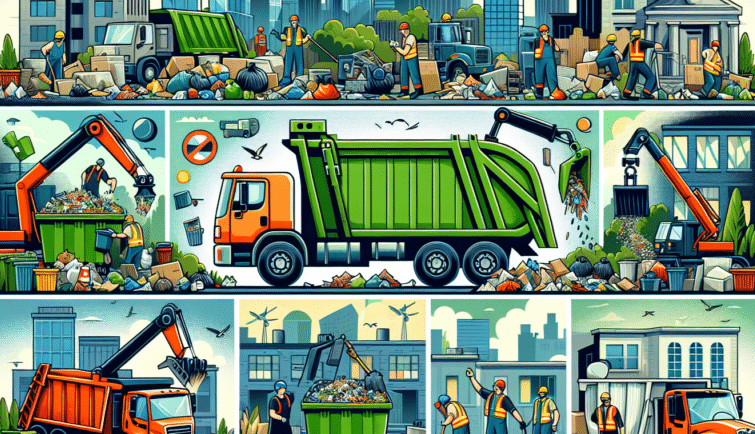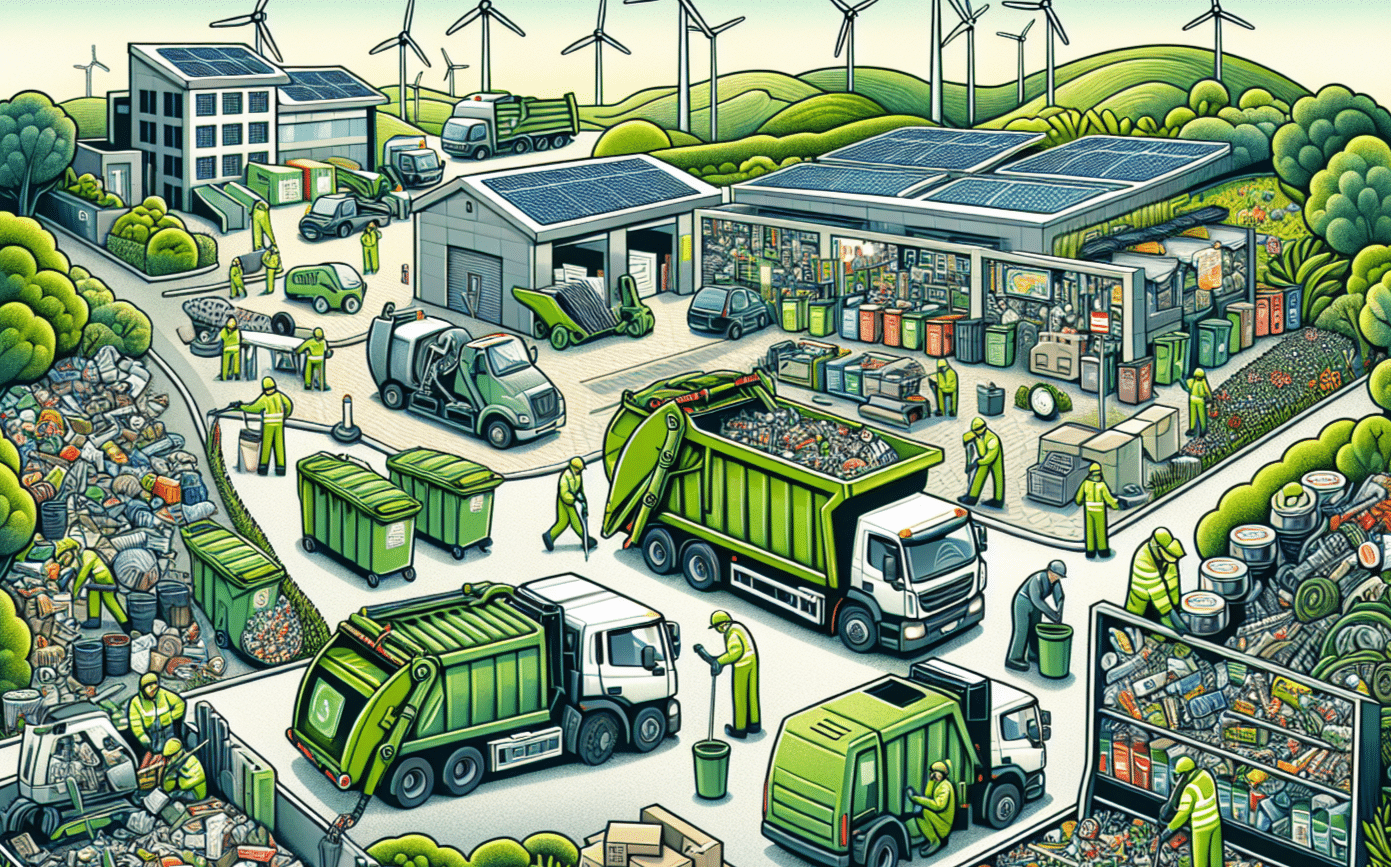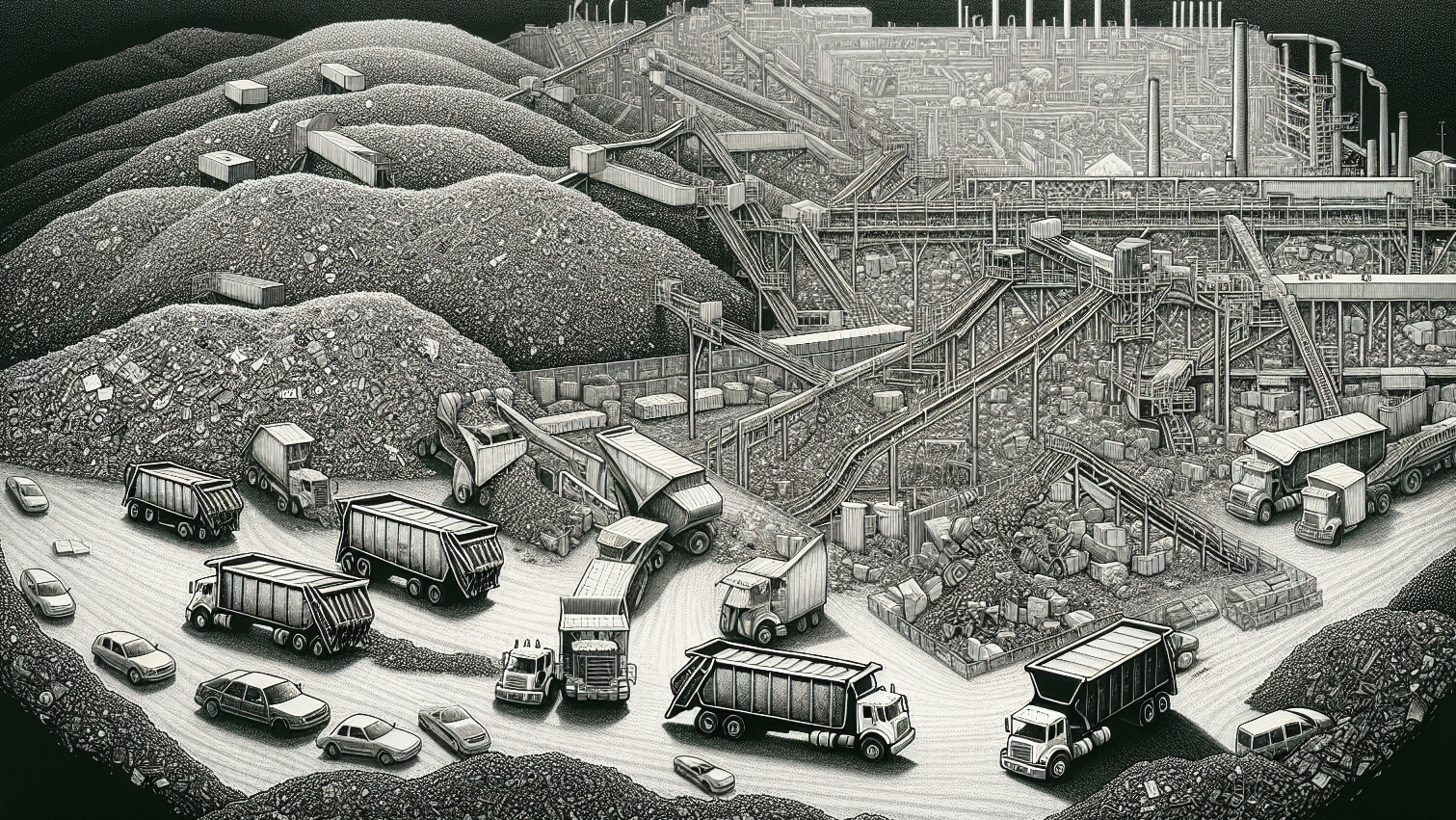Navigating landfills in Reno, NV, can seem daunting. Cut through the confusion with this straightforward guide that zooms in on Reno’s landfill locations, standards, and accepted waste types. Here, you will find everything you need to tackle waste disposal with confidence, from operational logistics to sustainability tips.
Key Takeaways
- Reno’s Lockwood Landfill is central to its waste management system, accommodating a variety of waste including Municipal Solid Waste (MSW) and providing different solutions for residential, commercial, and special waste handling.
- Free dumping days in Washoe County help residents manage waste by allowing disposal of up to three cubic yards of waste, four times annually at no cost.
- Recycling programs in Reno, such as single-stream recycling and specialty recycling services for cell phones and tires, aim to protect Nevada’s environment and promote sustainable waste management.
Navigating Reno’s Landfill Landscape

Reno’s waste management system is designed to cater to the diverse needs of its residents and businesses. The key facility for waste disposal in the Reno area is the Lockwood Landfill, located about 10 miles east of the city. Here are some key facts about the landfill:
- Spans approximately 3,200 acres, with 555 acres dedicated to landfill operations
- Plays a crucial role in managing Municipal Solid Waste (MSW) generated by households, commercial establishments, and institutions
- The composition of MSW typically includes food waste, paper, plastics, glass, and metals, all of which require proper disposal to minimize environmental impact.
Understanding the options available for waste disposal is essential for both residential and commercial customers. Here are the different solutions available:
- Residential waste disposal: This focuses on handling everyday household items and oversized waste.
- Commercial waste disposal: This caters to construction debris and mixed waste materials.
- Special waste handling: This ensures that hazardous and electronic waste is disposed of responsibly.
Residential Waste Solutions
Proper disposal of household hazardous waste (HHW) is crucial to prevent environmental contamination. Residents are encouraged to participate in recycling programs and properly dispose of electronic waste and other hazardous materials. This not only helps in keeping the environment clean but also reduces the risk of illegal dumping. By taking advantage of these services, Reno residents can contribute to a more sustainable waste management system. Some ways to properly dispose of HHW include:
- Participating in local recycling programs
- Dropping off electronic waste at designated collection sites
- Using hazardous waste collection events or facilities
- Following guidelines for disposing of paint, batteries, and other hazardous materials
By following these practices, you can ensure that HHW is disposed of safely and responsibly.
Commercial Waste Disposal
Commercial waste disposal in Reno is tailored to meet the needs of businesses, particularly those involved in construction and demolition (C&D) activities along the commercial row. C&D waste includes materials from construction, renovation, and demolition projects, such as wood, concrete, drywall, and brick. Reno provides specialized disposal services for construction debris, with dedicated construction landfills and concrete dumps to accommodate such waste.
Special Waste Handling
Proper disposal of special waste, such as household hazardous waste (HHW) and electronic waste, is essential to protect the environment. HHW includes hazardous materials or products generated from households, which require careful handling and disposal. Electronic waste, such as old cell phones, is not accepted during free dumping days at transfer stations or Lockwood Landfill. Appliances containing Freon must be disposed of properly to prevent environmental pollution. Ensuring that these items are handled by certified professionals helps in mitigating the risks associated with hazardous waste.
A Guide to Free Dumping Days and Policies
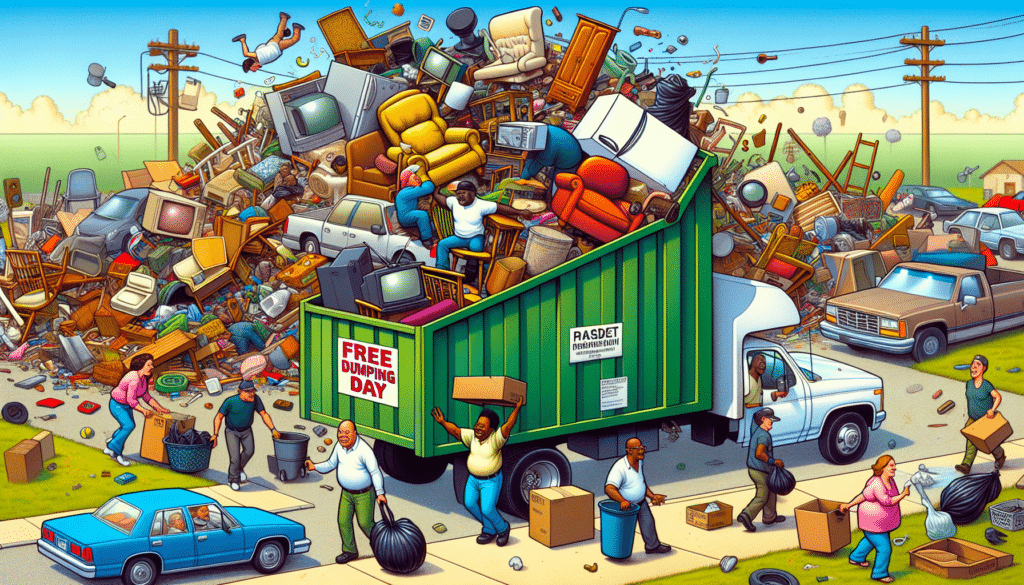
Free dumping days in Washoe County provide an excellent opportunity for residents to dispose of their waste without incurring additional costs. These services are available to residents with an active Waste Management account, allowing them to dispose of up to one standard pickup of trash or three cubic yards of waste at transfer stations or Lockwood Landfill four times annually. This initiative not only helps residents manage their waste more efficiently but also plays a significant role in curbing illegal dumping.
To take advantage of free dumping days, residents must provide valid identification matching the residential address on their Waste Management account and proof of a current Waste Management bill. To allow tenants to use the free dump privileges, property owners can fill out an authorization form for the day of service. This form grants tenants access to the dump facilities.
Eligibility and Documentation
Eligibility for free dumping services requires residents to have a good-standing account with Waste Management, entitling them to four free dumps per year. Property owners can authorize tenants to utilize these privileges by filling out an authorization form specifically on the day the service is utilized. This ensures that all eligible residents can benefit from the free dumping services available.
Acceptable Items and Volume Limits
During free dump weekends, residents can dispose of various bulky waste items at Lockwood Landfill, including sofas, chairs, mattresses, and box springs. Additionally, the landfill allows the disposal of a maximum of four tires per customer during these periods. These measures help residents clear out large items without the burden of additional costs.
Location and Operating Hours
Free drop-off sites are strategically located throughout Reno, NV, providing residents with convenient options for disposing of certain types of waste without charge. Most free drop-off sites operate from Monday through Friday, typically starting from the morning until the late afternoon. Operating hours can vary for different types of waste, so it is advisable for residents to check specific timings for hazardous waste, large items, or recyclables.
Recycling Programs: Protecting Nevada’s Environment
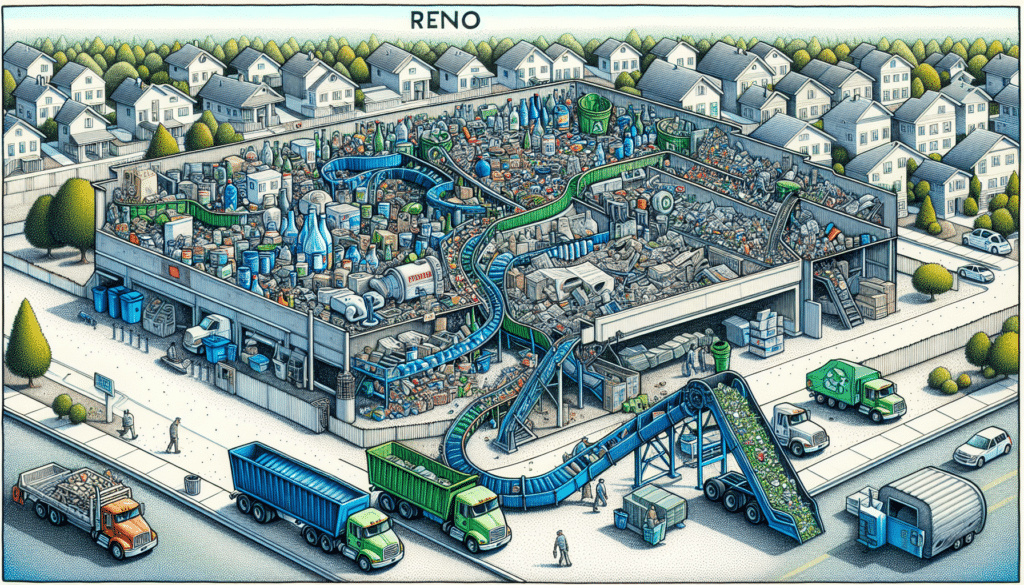
Recycling programs in Reno play a crucial role in protecting Nevada’s environment by promoting the responsible disposal of waste and the recovery of valuable materials. The single-stream recycling program allows residents to recycle a variety of materials conveniently, enhancing participation and reducing contamination. Specialty recycling services are also available. These specialty services cater to items like cell phones and tires, ensuring that these materials are recycled properly and do not end up in landfills. Community involvement and education are also essential components of Reno’s recycling efforts, helping to raise awareness and encourage responsible waste management practices.
Single-Stream Recycling
Single-stream recycling in Reno streamlines the recycling process by allowing residents to place all recyclables into one bin. Collection crews then transport these materials to a Material Recovery Facility (MRF), where advanced sorting equipment separates the mixed recyclables into their correct grouping of paper, plastics, metals, and other commodities. After sorting, the recyclable materials are baled and shipped to various manufacturing plants to be used in creating new products.
Specialty Recycling Services
Specialty recycling services in Reno address the need for proper disposal of items like cell phones and tires. Recycling cell phones conserves resources by reclaiming precious metals and plastics that can be used in various products, thereby reducing the need for virgin materials and minimizing environmental impact. Various programs facilitate cell phone recycling, inviting participation from consumers through convenient drop-off centers or mail-in options provided by retailers, service providers, and charities. Similarly, tires, due to their large volume and durability, pose environmental risks if not managed properly. By participating in tire recycling programs, residents can ensure that these items are disposed of responsibly, reducing their environmental impact and contributing to a cleaner community.
Community Involvement and Education
Community involvement and education are vital in promoting recycling and sustainable waste management practices. The Nevada Recycling Hotline provides information and guidance on Reno’s recycling programs, helping to educate the community and encourage participation.
The Cost of Disposing: Understanding Landfill Fees

Understanding landfill fees is essential for residents and businesses to manage their waste disposal costs effectively. Sage Street Transfer Station offers free disposal programs for certain items, including metal, recyclable materials, and sharps, which must be safely enclosed in an appropriate container for disposal. These free disposal options help residents manage specific types of waste without incurring additional costs.
In addition to standard landfill fees, there may be additional charges for disposing of specific items like appliances and concrete waste. Knowing these costs upfront can help residents and businesses plan their waste disposal more efficiently, avoiding unexpected expenses and ensuring compliance with local regulations.
Standard Landfill Fees
All residential customers with good standing accounts in Reno are eligible for four free dumps per calendar year at the Sage Street Transfer Station. In addition to the free dumps, Sage Street Transfer Station offers a free drop-off program for the safe disposal of sharps such as used syringes and needles. Appliances without Freon can be dropped off free of charge, but if the Freon has been removed, a certified letter from the licensed contractor who removed it is required. These measures ensure that residents can dispose of specific types of waste responsibly and without incurring additional costs.
Additional Charges for Specific Items
While many items can be disposed of for free or at a standard rate, certain materials incur additional charges due to the specific handling requirements they entail. When disposing of concrete, for example, it is important that the concrete pieces not exceed 12 inches by 12 inches to avoid extra charges at the landfill. By being aware of these guidelines, residents can plan their waste disposal more effectively and avoid unexpected costs.
Payment Methods and Account Management
Payment methods for landfill fees in Reno are designed to be flexible and convenient for residents. Customers can manage their accounts online, ensuring they stay in good standing to access free dumping privileges. Property owners can authorize tenants to use these privileges by completing an authorization form on the day of service, making the process seamless for multi-tenant properties.
Curbing Illegal Dumping: Local Regulations and Penalties
Illegal dumping is a significant issue that poses environmental and public health risks. In Reno and across Nevada, illegal dumping is considered a criminal offense that can lead to misdemeanor charges. The penalties for illegal dumping include:
- Criminal and civil penalties
- Community service
- Revocation of business licenses for companies involved in such practices
- Significant fines for individuals caught illegally dumping waste.
To combat illegal dumping, local authorities have established stringent regulations and enforcement measures. Residents are encouraged to report illegal dumping incidents to the Washoe County Sheriff’s Office or use designated reporting channels for dumpsite reports. By understanding and adhering to these regulations, residents and businesses can help maintain a cleaner and safer environment in Reno.
Definition and Risks of Illegal Dumping
Illegal dumping is defined as the unauthorized disposal of waste that exceeds typical litter size into unauthorized areas, including land and water. This practice poses numerous risks, including the contamination of watersheds, harm to wildlife, creation of fire hazards, and the lowering of property values. Additionally, the costs of cleaning up illegally dumped waste often fall on taxpayers, adding an unnecessary financial burden to the community.
Reporting and Enforcement
Residents of Washoe County can report illegal dumping by contacting the Washoe County Sheriff’s Office or using designated reporting channels like 329-DUMP for dumpsite reports and 785-WCSO for active dumping incidents. Local law enforcement authorities, including sheriffs, police departments, and health officers, are empowered to issue citations for illegal dumping violations.
Alternatives to Illegal Dumping
To prevent illegal dumping, Reno and its surrounding areas offer several alternatives for waste disposal. Lockwood Landfill, in partnership with Reno, Sparks, Washoe County, and Storey County, organizes free dump weekends to facilitate household cleanups and discourage illegal dumping. These events provide residents with the opportunity to dispose of large and bulky items without incurring additional costs.
Sustainable Practices: From Landfill to Reuse Centers

Sustainable waste management practices are essential for minimizing environmental impact and promoting resource conservation. In Reno, various initiatives contribute to these efforts, including:
- Waste-to-energy programs that convert waste materials into usable energy, helping to reduce landfill waste and generate renewable energy sources
- Donation and reuse opportunities that allow for the repurposing of items and reduce the amount of waste sent to landfills
- Efficient landfill management strategies that prioritize recycling and proper disposal methods
These initiatives work together to minimize waste and promote a more sustainable approach to waste management in Reno.
Waste-to-Energy Initiatives
Waste-to-energy initiatives in Reno play a significant role in sustainable waste management by converting waste materials into usable energy. Local landfills have developed technologies to capture landfill gas, which is then used to generate electricity or heat. This process not only reduces harmful emissions but also provides a valuable resource that can be utilized by the community. By supporting waste-to-energy projects and recycling programs, residents and businesses can help reduce the environmental impact of waste disposal and promote renewable energy sources.
Donation and Reuse Opportunities
Donation and reuse opportunities offer a practical solution for reducing landfill waste while benefiting the community. Some examples include:
- Clean concrete can be repurposed for various applications such as road base and landscaping, presenting another opportunity to reduce landfill use.
- Donating usable items to local charities.
- Visiting reuse centers.
These are viable alternatives to discarding items in landfills.
Impact on Community and Environment
The impact of sustainable waste management practices on the community and environment is profound. Enhanced waste processing technologies have led to cleaner water and soil, contributing to better public health outcomes. The innovative use of landfill space for recreation and wildlife habitats has set a benchmark for sustainable landfill management globally. By adopting sustainable waste management practices, the Reno community can continue to protect the environment and ensure a healthier future for all.
Summary
Reno’s commitment to efficient and sustainable waste management practices is evident through its comprehensive landfill options, free dumping services, and robust recycling programs. By understanding the costs associated with waste disposal, adhering to local regulations, and participating in sustainable initiatives, residents and businesses can contribute to a cleaner and more environmentally friendly community.
Frequently Asked Questions
Who is eligible for free dumping services in Washoe County?
Washoe County residents with an active Waste Management account in good standing are eligible for free dumping services four times a year.
What items can be disposed of during free dump weekends?
You can dispose of sofas, chairs, mattresses, box springs, and up to four tires per customer during free dump weekends.
How do I report illegal dumping in Reno?
To report illegal dumping in Reno, you can contact the Washoe County Sheriff’s Office or use the designated reporting channels like 329-DUMP.
What is single-stream recycling?
Single-stream recycling allows residents to place all recyclables into one bin, making the recycling process easier and increasing participation.
Are there any additional charges for disposing of specific items?
Yes, there may be additional charges for disposing of items like appliances with Freon, asbestos, and roofing materials. Be sure to check the specific disposal guidelines to avoid any unexpected fees.






































































